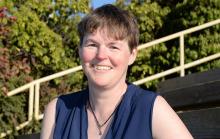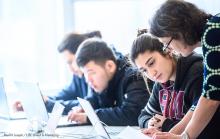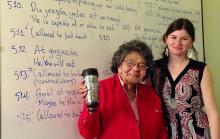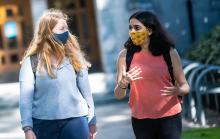Member Spotlights
-
 May 12, 2021
May 12, 2021LangSci After Grad: Finding your niche outside your department, Dr. Jennifer Abel
LangSci After Grad is a new series interviewing graduate and post-doctoral alumni with language sciences qualifications about their transition from academia to employment, written by AJ Orena Working for the UBC Research Commons while completing a Linguistics PhD helped Dr. Jennifer Abel find…
-
 May 12, 2021
May 12, 2021'We can work with language towards a more just society', Living Language alumni Q&A
Language can be used by humans to work towards a more just society. That's just one of the many things Jewel Goodwin learned in the Living Language: Science and Society course in 2020. A recent Speech Sciences graduate, Jewel shares her thoughts on the course and advice for students considering…
-
 April 21, 2021
April 21, 2021LangSci After Grad: From PhD to language coach for First Nations languages, Dr. Sonja Thoma
Langsci After Grad is a new series interviewing graduate degree and post-doctoral alumni with language sciences qualifications about their transition from academia to employment, written by AJ Orena Dr. Sonja Thoma first became interested in language documentation and revitalization while…
-

-
 April 1, 2021
April 1, 2021Concerned about your toddler not talking? Here are some expert tips and resources for parents
If your toddler isn’t talking, there could be a number of reasons. Expert resources and support are available to help children reach their full potential. On World Autism Awareness Day (April 2nd), Language Sciences member Dr. Paola Colozzo, an Associate Professor in the School of Audiology and…
-
 March 31, 2021
March 31, 2021Adopted by Tlingit, descended from Mohawk: how learning Lingít helped UBC student discover her history and strive for a future of reciprocal, respectful research
When the Tlingit community adopted UBC student Éedaa Heather Burge, she was brought in from the cold. Studying the language in Juneau, Alaska, that could be taken literally, but the Lingít phrase for adoption ‘A tóot ajeewatán’ means to take someone’s hand and bring them inside. Her adoptive…
-
 March 30, 2021
March 30, 2021How to talk to people about climate change
-
 March 1, 2021
March 1, 2021Pithy Papers: The influence of gesture, adult porcine cochlea, and translator identity
Welcome to the second instalment of Pithy Papers, where we highlight important and interesting research in the last three months by members from our three research themes, in 150 words or fewer. Find out how gesture influences communication, why it's important that adult porcine…
-
 February 26, 2021
February 26, 2021Eight tips to communicate better while wearing a face mask
-
 January 15, 2021
January 15, 2021Interdisciplinary team to study how literacy is changing in a digital, multicultural, and COVID-hit, world
Image credit: NIRx Medical Technologies, a partner on 'Ensuring Full Literacy in a Multicultural and Digital World' The literacy landscape is changing: Canadians are increasingly reading in a digital format, and speak a language or are from a culture not represented in commonly…